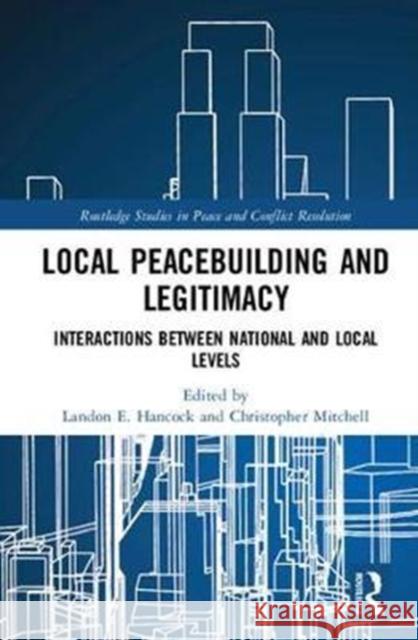Local Peacebuilding and Legitimacy: Interactions Between National and Local Levels » książka
Local Peacebuilding and Legitimacy: Interactions Between National and Local Levels
ISBN-13: 9781138224148 / Angielski / Twarda / 2018 / 244 str.
Local Peacebuilding and Legitimacy: Interactions Between National and Local Levels
ISBN-13: 9781138224148 / Angielski / Twarda / 2018 / 244 str.
(netto: 746,32 VAT: 5%)
Najniższa cena z 30 dni: 705,23
ok. 22 dni roboczych.
Darmowa dostawa!
This volume searches for pragmatic answers to the problems that continue to plague peacebuilding efforts at all levels of society, with a singular focus on the role of legitimacy in peacebuilding. Many peacebuilding efforts are hampered by their inability to gain the support of those they are trying to help at the local level, or those at regional, national or international levels; whose support is necessary either for success at the local level or to translate local successes to wider arenas. There is no one agreed-upon reason for the difficulty in translating peacebuilding from one arena of action to another, but among those elements that have been studied, one that appears understudied or assumed to be unimportant, is the role of legitimacy. There are many questions that can be asked about legitimacy as a concept. What is legitimacy and how is it defined? Is it derived from an etic of professionalism or an emic of social acceptability? How do different groups engaged in peacebuilding acquire legitimacy? Is the kind of legitimacy necessary for local peacebuilding, like that required for a successful zone of peace, the same kind of legitimacy that is necessary for regional, national or international peacebuilders? If these kinds of legitimacy are different, does the kind that works at one level undermine the kind that works at another? These are the kinds of questions that this volume addresses through multiple case studies examining legitimacy at local, regional, national and international levels, as well as how legitimacy at one level either translates or fails to translate into legitimacy at other levels in order to correlate the level of legitimacy with the success or failure of peacebuilding projects and programs. The value of this work lies both in the breadth of the cases and the singular focus on the role of legitimacy in peacebuilding. By focusing on this concept this volume represents an attempt to build beyond the critical peacebuilding approach of deconstructing the liberal peacebuilding paradigm to a search for pragmatic answers to the problems that continue to plague peacebuilding efforts at all levels of society. It is our belief that these chapters will illuminate one of the more important concepts that can help or hinder peacebuilding success and that we can begin to build a theoretical understanding of legitimacy and how it can be acquired, sustained and transmitted in a manner that will assist peacebuilders to meet the needs of the multiple stakeholders involved in these projects. This book will be of much interest to students of peacebuilding, conflict resolution, development studies, security studies and International Relations.











